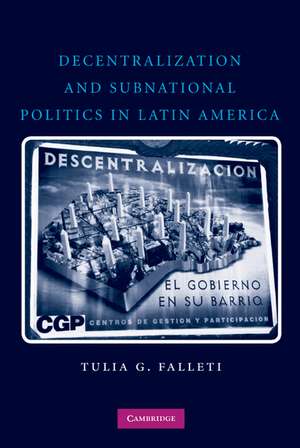Decentralization and Subnational Politics in Latin America
Autor Tulia G. Falletien Limba Engleză Paperback – 11 apr 2010
| Toate formatele și edițiile | Preț | Express |
|---|---|---|
| Paperback (1) | 261.86 lei 3-5 săpt. | |
| Cambridge University Press – 11 apr 2010 | 261.86 lei 3-5 săpt. | |
| Hardback (1) | 555.50 lei 6-8 săpt. | |
| Cambridge University Press – 11 apr 2010 | 555.50 lei 6-8 săpt. |
Preț: 261.86 lei
Nou
Puncte Express: 393
Preț estimativ în valută:
50.12€ • 54.46$ • 42.13£
50.12€ • 54.46$ • 42.13£
Carte disponibilă
Livrare economică 31 martie-14 aprilie
Preluare comenzi: 021 569.72.76
Specificații
ISBN-13: 9780521736350
ISBN-10: 0521736358
Pagini: 312
Ilustrații: 25 b/w illus. 17 tables
Dimensiuni: 152 x 229 x 16 mm
Greutate: 0.41 kg
Editura: Cambridge University Press
Colecția Cambridge University Press
Locul publicării:New York, United States
ISBN-10: 0521736358
Pagini: 312
Ilustrații: 25 b/w illus. 17 tables
Dimensiuni: 152 x 229 x 16 mm
Greutate: 0.41 kg
Editura: Cambridge University Press
Colecția Cambridge University Press
Locul publicării:New York, United States
Cuprins
1. Decentralization and the revival of subnational politics; 2. A sequential theory of decentralization and the intergovernmental balance of power; 3. Argentina: the national dominance path to decentralization; 4. Colombia: the subnational dominance path to decentralization in a unitary country; 5. Brazil: the subnational dominance path to decentralization in a federal country; 6. Mexico: the subnational response path to decentralization; 7. Conclusion: decentralization, temporal analysis, and territorial politics; Appendix: in-depth interviews.
Recenzii
“Sequence analysis meets subnational politics in this must-read study of decentralization in Latin America. Drawing on extensive original research in four countries, Falleti uses a new ‘comparative sequence method’ to show how decentralization reforms varyingly empower subnational political actors depending on when and in what order they are adopted. This fascinating argument is a shining example of the power of comparative-historical analysis and will become a touchstone for all future research on subnational politics in Latin America.”
—James Mahoney, Northwestern University
“Advocates and detractors of decentralization have assumed that it increases the power of subnational governments – whether for good or for ill. But what if they are both wrong? In this important and innovative work, Tulia Falleti offers a major corrective to the literature on decentralization by showing that decentralizing reforms do not necessarily enhance the resources, authority and capacity of subnational officials relative to the center. It all depends, according to Falleti, on the territorial interests (national or subnational) that dominate the initial decision to decentralize, along with the particular sequence of decentralizing reforms (administrative, fiscal and political) that is thereby set in motion. Based on exhaustive research in four major Latin American countries, Falleti offers a theory of decentralization that is both elegant and respectful of the complexities of her cases. This book should be carefully read not only by students of decentralization, but by the scores of development practitioners who are actively engaged in programs of support for decentralization across the developing world.”
—Kent Eaton, University of California, Santa Cruz
“Falleti’s original sequential theory of decentralization persuasively explains the variation in the substance and effects of decentralization in Latin America’s largest countries according to the timing of the entrance of the national and local actors onto the stage. Informed by more than one hundred and fifty in-depth interviews with top ranking politicians and extensive archival research, this marvelous book makes a compelling contribution to the study of Latin American politics.”
—Frances Hagopian, University of Notre Dame
“Tulia Falleti’s study of decentralization in Latin America is a jewel of thoughtful, comparative analysis. Why is there so much variation in the autonomy of subnational governments? The answer is elegant and powerful: final outcomes depend heavily on initial reforms. A territorial coalition that prioritizes political over administrative decentralization carves a path to deeper subnational autonomy than one that prefers administrative over political decentralization. This is a must-read for anyone interested in decentralization.”
—Liesbet Hooghe, University of North Carolina, Chapel Hill
—James Mahoney, Northwestern University
“Advocates and detractors of decentralization have assumed that it increases the power of subnational governments – whether for good or for ill. But what if they are both wrong? In this important and innovative work, Tulia Falleti offers a major corrective to the literature on decentralization by showing that decentralizing reforms do not necessarily enhance the resources, authority and capacity of subnational officials relative to the center. It all depends, according to Falleti, on the territorial interests (national or subnational) that dominate the initial decision to decentralize, along with the particular sequence of decentralizing reforms (administrative, fiscal and political) that is thereby set in motion. Based on exhaustive research in four major Latin American countries, Falleti offers a theory of decentralization that is both elegant and respectful of the complexities of her cases. This book should be carefully read not only by students of decentralization, but by the scores of development practitioners who are actively engaged in programs of support for decentralization across the developing world.”
—Kent Eaton, University of California, Santa Cruz
“Falleti’s original sequential theory of decentralization persuasively explains the variation in the substance and effects of decentralization in Latin America’s largest countries according to the timing of the entrance of the national and local actors onto the stage. Informed by more than one hundred and fifty in-depth interviews with top ranking politicians and extensive archival research, this marvelous book makes a compelling contribution to the study of Latin American politics.”
—Frances Hagopian, University of Notre Dame
“Tulia Falleti’s study of decentralization in Latin America is a jewel of thoughtful, comparative analysis. Why is there so much variation in the autonomy of subnational governments? The answer is elegant and powerful: final outcomes depend heavily on initial reforms. A territorial coalition that prioritizes political over administrative decentralization carves a path to deeper subnational autonomy than one that prefers administrative over political decentralization. This is a must-read for anyone interested in decentralization.”
—Liesbet Hooghe, University of North Carolina, Chapel Hill
Notă biografică
Descriere
Tulia G. Falleti explains the different trajectories of decentralization processes in post-developmental Argentina, Brazil, Colombia, and Mexico, and why their outcomes diverged so markedly.

















